Przekład Ḥam Ribi Avrama Finciego wybranych tekstów Zoharu na ladino jako rzadkie spojrzenie w metodologię pracy tradycyjnych bośniacko-sefardyjskich jeszybot (klubów edukacyjnych dla dorosłych) oraz jej związek z lokalną, islamsko-suficką tradycją h
Ḥam Ribi Avram Finci’s Ladino Translation of Selected Texts from the Zohar as a Rare Glimpse into the Methodology of Traditional Bosnian Sephardic Yeshivot (Adult Learning Clubs) and Its Relation to the Local Sufi Islamic Tradition of Ders
Author(s): Eliezer PapoSubject(s): Jewish studies
Published by: Instytut Slawistyki Polskiej Akademii Nauk
Keywords: Sephardic studies; Sephardic culture; Ladino literature; Ottoman Jews; Bosnian Jewry; Rabbinic literature in Judeo-Spanish; Sephardic Sermon; Judaism & Sufism; Balkan Culture; Balkan Jews
Summary/Abstract: In traditional Sephardic culture, theoretical Kabbalah was an exclusive patrimony of the rabbinic elite. From the 17th century onward, many Sephardic laymen found even the Hebrew liturgical, and especially speculative, texts to be impenetrable and incomprehensible. Consequently, the rabbinic elite began to translate liturgical texts and halakhic works into popular Judeo-Spanish. However, the Zohar was usually not included in these projects of cultural intermediation. Consequently, a Judeo-Spanish translation of the integral text of the Zohar, or even of one of its volumes, does not exist to this day. At the same time, different Sephardic rabbis translated selected excerpts from the Zohar into the vernacular. This paper analyses one such anthology, Avram ben Moshe Finci’s Leket a-Zoar, published in 5619 (1858/9) in Belgrade. The anthology contains 246 excerpts from the Zohar, 121 of which conclude with Finci’s own reflections and a resumé of the moral of the story. Many of Finci’s discourses are masterpieces of the traditional Judeo-Spanish oral genre of darush. Finci was not interested in explaining theoretical kabbalistic terms and concepts. Rather, he reads the Zohar as if it were a work of Mussar. The traditional learning of Bosnian Sephardim seems to resemble, in both methodology and content, the learning traditions of their Muslim neighbours, showing once again that settled communities such as the Ottoman Sephardim cannot be researched only in the context of their affinity to the Jewish world. It is impossible to understand the way the Ottoman Sephardim developed Jewish concepts, practices and institutes without acknowledging the common Ottoman culture they shared with their Muslim and Christian neighbours.
Journal: Colloquia Humanistica
- Issue Year: 2020
- Issue No: 9
- Page Range: 181-222
- Page Count: 42
- Language: English

